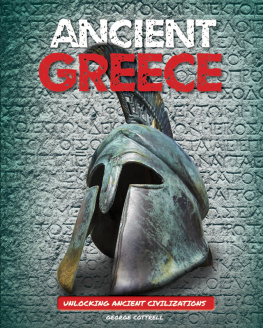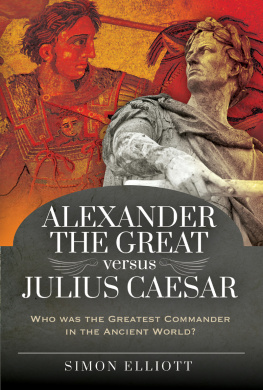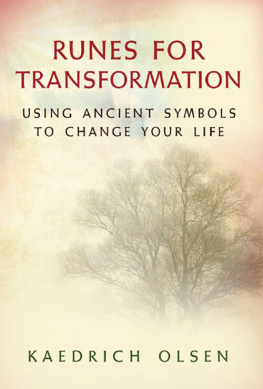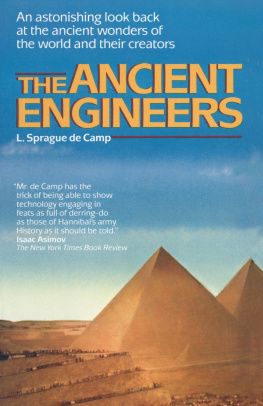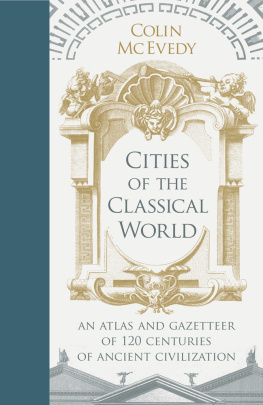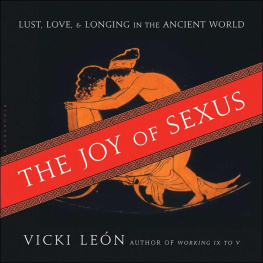WORKING
IX TO V
BY THE SAME AUTHOR
Uppity Women of Ancient Times
Uppity Women of Medieval Times
Uppity Women of the New World
Uppity Women of the Renaissance
WORKING
IX TO V
Orgy Planners,
Funeral Clowns,
and Other Prized
Professions of the
Ancient World
VICKI LEN

Copyright 2007 by Vicki Len
All rights reserved. No part of this book may be used or reproduced in any manner whatsoever without written permission from the publisher except in the case of brief quotations embodied in critical articles or reviews. For information address Walker & Company 104 Fifth Avenue, New York New York 10011.
Published by Walker & Company, New York
Distributed to the trade by Holtzbrinck Publishers
All papers used by Walker & Company are natural, recyclable products made from wood grown in well-managed forests. The manufacturing processes conform to the environmental regulations of the country of origin.
LIBRARY OF CONGRESS CATALOGING-IN-PUBLICATION DATA HAS BEEN APPLIED FOR.
ISBN-10: 0-8027-1556-7
eISBN- 978-0-802-71862-4
Visit Walker & Company's Web site
at www.walkerbooks.com
First U.S. edition 2007
3 5 7 9 10 8 6 4
Designed and typeset by Suzanne Albertson
Printed in the United States of America by
Quebecor World Fairfield
CONTENTS


The Greeks and Romans lacked paper currency, but had quite a lineup of coinage and an array of mysterious abbreviations for them. Fortunately, this book will not subject you to their intricacies. Frequently mentioned mediums of exchange and their approximate buying power:
Greek
The obol: smallest silver coin; six obols = one drachma
The drachma: roughly equivalent to the Roman denarius
The talent: not a coin but a large sum represented by its weight in gold or silver; six thousand drachmas = one talent
Roman
the sesterce: a bronze coin; four sesterces = one denarius
the denarius (plural denarii): a silver coin
the aureus (plural aurei): a gold coin; twenty-five denarii = one aureus
As you'll see throughout this book, daily wages often fell in the one to three-drachma (or the equivalent in denarii) rangeor less. Countless jobs also paid by piecework, from the Acropolis sculptures to brickmaking. The lack of records, along with inflation and coinage debasement, make it difficult to assess buying power over centuries. It's safe to say that a tiny percentage had obscene wealth, while most workers scraped by, aided by a few social programs. For instance, a baker or a carpenter might earn fifty denarii a day, then spend twenty-four denarii to buy two pounds of pork to feed his family.
Annual pay for legionary soldiers went from 112 denarii in the second century B.C. to 300 denarii per year in A.D. 83. But their daily bread and other expenses were deducted from that sum.
On Emperor Diocletian's list of wage and price ceilings of A.D. 301, a bushel of wheat or beans cost one hundred denarii, and a gallon of the cheapest wine cost sixty-four denarii. It would take a teacher with four pupils a month to earn that sum.
At the other end of the career scale: in the first century A.D., a man needed a net worth of one million sesterces to qualify for Roman senatorship.

Two thousand years ago, a world uncannily like ours moved at a hustle, its people working a jaw-dropping assortment of jobs to earn their daily bread. Instead of going on a Mediterranean diet, they ate one. Their traders made a killing, traveling on business. So did their food products and manufactured wares, sailing in superfreighters or moving around an intercontinental highway system fifty-three thousand miles long.
That world, spreading like an anaconda around the Mediterranean and Black seas and into the Atlantic, we now call the Roman Empire. A deceptive tag, since its political expansion began around 220 B.C. when Rome was still a republic. Like the anaconda, the republic-turned-empire swallowed cultures whole to get to its size. It didn't digest them, however. Instead, its new subjects were free to swear in their native languages and worship their own tongue-twister gods.
The head honchos had an ingenious corporate policy: rather than force those conquered to assimilate, they adopted the best-loved customs, festivals, and deities of the newbies, a neat trick called syncretism. Being rather intimidated by Greek culture, they stole it wholesale, lifting great chunks of science and the arts, giving new names to ancient deities.
The Roman Empire was all about business. To conduct it, everyone used two lingua francas, Latin and Greek. Instead of shareware, people shared the same laws, calendar, and currencies. The ease of buying and selling, safeguarded by a standing army of peacekeepers, made this early version of the European Union boom.
Across this world, workers put in their eight hours between dawn and 3 P.M. Weekends off? The concept didn't exist yet. Instead, there were growing numbers of festivals, emperors birthdays, theater-bloodsport-and-racing days, and evil-omen dates on which no work could be done. In A.D. 165, Emperor Aurelius froze the runaway holiday calendar to 135 days a year. Nice try; by A.D. 354, it had risen to 177 days of leisureor its possibility. (Like our official holidays, many people had to work while others played.)
On the job, employees gossiped about higher-ups and jockeyed for perks. When management took a wine break, they checked their horoscopes. They made bets on favorite teams while lunching at fast-food joints. They met for drinks at the end of the workday. From CEOs to entry-level employees, everyone griped about taxation on almost everything. Everyone except the gainfully employed legions of bean-counters and papyrus-shufflers who collected taxes, that is.
Workforce demographics were a weird preview of modern statistics. Some job-holders had nest eggs; a great many more had crushing debts. Most socialized at work-related associations, which helped them squirrel away money for a decent burial. Certain workers, notably the military, got lump-sum pensions upon retirement. Others spent their later years in retirement colonies. Most civilians, however, got zip. For health care, they sought help at holistic centers like the sanctuaries of Asclepius, god of healing.
Even their growth industries anticipated ours. Government bureaucracy and the military were big biz. Likewise entertainment and spectator sports, from musical theater to celebrity-studded chariot racing. Construction for new colonies, new ports, grander temples, and second villas for senators kept carpenters, plumbers, crane operators, hydraulic engineers, salvage divers, and surveyors busy. Agribusiness, especially wheat, wine, and olive oil, was huge, supplying the staff of life to three continents. Much of it was shipped and stored in clay amphorae, the cheap, recyclable packaging of the dayitself a moneymaker for manufacturers.
Small businesses thrived everywhere. Fast-food franchises, wine shops, and service jobs like signwriters, town criers, anointers, tattoo removers, and armpit pluckers kept the economy rolling. There were dodgier gigs, most of them infamous but perfectly legitimate: auctioneer, gladiator trainer, and the informer or accusation specialist. Posts of more prestige included an alphabet soup of priests, entrail-readers, and oracle-slingers.
Next page


